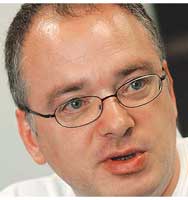Public Relations Metrics: Interview mit Dejan Vercic
By: AA, AZ / 04.07.08
Im Rahmen der diesjährigen Bledcom-Konferenz wurde heute der neue Sammelband zur PR-Evaluation von Betteke van Ruler, Ana Tkalac Verčič und Dejan Verčič vorgestellt. Das Buch wurde im renommierten US-Verlag Lawrence Erlbaum veröffentlicht. Es enthält Beiträge von Wissenschaftlern aus den Vereinigten Staaten, Europa, Asien und Afrika. Communicationcontrolling.de sprach mit Mitherausgeber Prof. Dejan Verčič Ph. D., Professor für Public Relations an der Universität Ljubljana, Slowenien.
communicationcontrolling.de: You are co-editor of the newly published book "Public Relations Metrics". In the introduction it is said that there has been a change in the view of public relations evaluation recently. What does that mean?Prof. Dr. Dejan Verčič: As the role of public relations is increasing in contemporary society and investments in it are increasing as well, there are more and more requests for its accountability and this involves formal evaluation capabilities. In today's world practitioners need more sophisticated literature on formal, social science based research and evaluation than it was available so far and for that reason we decided to edit this book.
communicationcontrolling.de: What are the fundamental questions of any evaluation efforts in public relations?
Verčič: The most fundamental questions regard formal goal-setting and planning of public relations activities in such a way that allows a meaningful, timely and relevant evaluation that can directly influence further actions. To be conceptually clear about what we are doing in practice and how can formal research enlighten us effectiveness and efficiency. Without this initial basically mental investments, material investments in field activities become witchcraft.
communicationcontrolling.de: The book develops a Public Relations Research Grid, which contrasts the level of evaluation (individual to society) with the purpose of evaluation (research on/for/in PR). Why did you choose these dimensions, and what are the main insights of the grid?
Verčič: As both educators and practitioners we have accumulated experience about misunderstandings people have when seeing and studying scientific research literature. They are often disappointed for not seeing practical relevance of societal-level research about public relations - well, that type of research is never done to be directly relevant in day-to-day practice. We developed a mental map that allows students and practitioners understand where what type of research fits into a broader picture of public relations research and that way enable them to pair the right type of research with the type of problems and questions students and practitioners face.
communicationcontrolling.de: The grid identifies 18 different spheres of PR evaluation. Which areas are the most important in practice and which play a relatively minor role until now?
Verčič: We have identified six levels of public relations research in practice: on individual, project, program, functional, organizational and societal level. We believe that all of them are important, but there very few reports available on the last four: we can mainly learn about them from case studies submitted for different professional awards - which is far from enough. There is more work needed on these basic, fundamental levels of applied research.
communicationcontrolling.de: One last question: What are the main challenges for public relations evaluation in the near future?
Verčič: I believe that the recent developments on the Internet will allow easier data collection and storage for types of evaluation needed in practical work. So far, public relations research has been too sporadic and too complicated compared to standardized types of research available in many other areas of corporate and marketing communication, for example advertising. By developing more comparable and standardized types of research in public relations will allow better control of funds spent and that way also substantially larger investments in public relations. This increases will, on the other hand, feed back again into more interest for the use of available data and thus upgrade our use of scientific research in public relations. So, hundred years after being envisioned as a social science based business discipline, public relations is starting to become what it has always meant to be.
Bibliographie
Van Ruler, Betteke/ Verčič, Ana Tkalac/ Verčič, Dejan (Hrsg.) (2008):
Public Relations Metrics. Research and Evaluation.
Mahwah (NJ): Lawrence Erlbaum Associates. 344 Seiten. ISBN: 978-0-8058-6273-7.
Dejan Verčič, Ph.D., FCIPR is a partner at Pristop agency and Associate Professor of Public Relations and Communication Management at the University of Ljubljana, Slovenia. He organizes the Lake Bled International Public Relations Research Symposia, held annually.
Betteke van Ruler, PhD, is Professor of Communication and Organization at the University of Amsterdam in the Netherlands. Her research focuses on the practice of communication management and the relationship between organizations and the press.
Ana Tkalac Verčič, PhD, is Assistant Professor of Marketing and Marketing Communications at the Graduate School of Business and Economics, in Zagreb, Croatia. Her major research interests are focused on attitude and attitude change in public relations. She is a former Fulbright scholar and a recipient of various other grants and scholarships.
--> zurück zu Praxiswissen.


